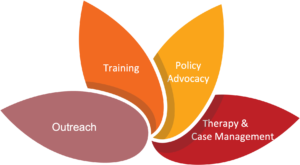At our Bay Area-based Mosaic Healing Center, we draw on synergies among the core components of our model to:
(a) Offer emotional and psychological support for individuals who have experienced severe violence and displacement,
(b) Enhance the capacity of clinicians to serve these populations, and
(c) Advocate for policies aimed at preventing trauma and further harm.
Mental Health Care | Global Trauma Healing Program
The Bay Area is home to a large population of individuals who have fled armed conflict and persecution in their home countries. Partnerships for Trauma Recovery’s Global Trauma Healing Program offers culturally aware, trauma-sensitive, and language-accessible mental health support for survivors of extreme violence from all cultural, ethnic, and linguistic backgrounds living throughout the greater San Francisco Bay Area.
Recognizing the significant need for trauma recovery — with an estimated 1.3 million survivors of torture in the United States alone — we aim to integrate group-based mental health approaches whenever possible, allowing us to efficiently reach larger numbers of survivors.
Language accessibility is crucial to ensuring mental health care is available for global communities resettled in the United States. Our team includes multilingual and multicultural providers who speak a wide range of languages, along with our Refugee Voices team of mental health interpreters. Since opening the Mosaic Healing Center in 2016, our staff and interpreters have provided care in over 15 languages, including some of the most commonly spoken languages among Bay Area communities such as Spanish, Tigrinya, Mam, Amharic, French, Portuguese, Arabic, and Farsi/Dari.
Our team is able to communicate in:
Amharic, Arabic, Dari, Farsi, French, German, Hebrew, Hindi, Italian, Mam, Mongolian, Nepali, Pashto, Portuguese, Punjabi, Spanish, Tamil, Tigre, Tigrinya, and Urdu.
Our interpreters are selected for their skills in mental health interpretation, cultural sensitivity, emotional awareness, and commitment to listening to stories of violence and ongoing trauma. We provide essential support and training to our Refugee Voices team to further strengthen their skills and prevent secondary trauma. In total, PTR has the ability to serve clients in over 20 different languages.
Clinical Training | Global Healing and Human Rights Training Program
With one of the few clinical training programs in the country focused on international trauma, Partnerships for Trauma Recovery (PTR) is working to bridge the gap between human rights work and mental health services. Through our Global Healing and Human Rights training program, we enhance clinical capacity among graduate psychology and social work students to serve global populations affected by war, torture, and other forms of severe persecution.
Through our customized training curriculum and comprehensive case supervision, our trainees gain a deep understanding of the psychological and emotional impacts of violence and displacement, along with the skills necessary to support survivors’ healing. With this specialized training, these globally-minded clinicians are equipped to share their expertise and clinical skills, expanding their reach to more survivors around the world.
Additionally, our program includes an advocacy component designed to equip trainees with the knowledge and tools to apply their understanding of the complex effects of violence and trauma in driving broader, systemic change through policy advocacy. Trainees complete an advocacy project during their training and are invited to join a network of PTR clinicians dedicated to advocating for policies that support survivors of severe violence and persecution.
Policy Advocacy | Mental Health Matters
While addressing trauma is critical for the well-being of survivors, their families, and communities, it is equally important for governments and civil society to take proactive steps to prevent violence and harm before they occur. Whether the policies are national in scope, such as the detention of individuals seeking safety, or global, as in a country's foreign relations, the mental and emotional health of communities is often deeply impacted.
Partnerships for Trauma Recovery's Mental Health Matters program seeks to strengthen and support advocacy efforts aimed at preventing trauma and further harm, and safeguarding those who have experienced severe violence. Through our direct connections with individuals and families affected by policies that neglect emotional well-being, PTR works to apply our insights to advocate for more compassionate and effective policies in the future.
By combining practice-based learning from our clinical trainees, doctoral-level research in psychology, and targeted advocacy efforts, we aim to foster public awareness of the internal experiences of trauma survivors and the broader impacts on mental health within families, communities, and society. Furthermore, by collaborating with organizations focused on advocacy, we aim to amplify calls for thoughtful, trauma-informed policies that prioritize emotional well-being and safety from violence.

